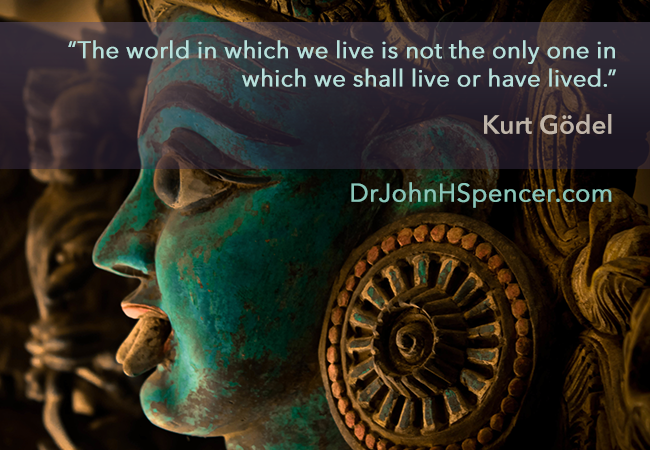
“The world in which we live is not the only one in which we shall live or have lived”.
For some people, such words will be nothing more than another example of illogical New Age nonsense. Others may cry “blasphemy!”, and say that (an all-loving) God shall condemn those who believe in reincarnation to an eternity of suffering. What irony, then, to discover that the author of such supposed illogical blasphemy was Kurt Gödel, one of the greatest pioneering logicians in history and a close companion to Albert Einstein at the Institute for Advanced Study, Princeton. A deep understanding and wide implementation of Gödel’s related ideas would undermine a variety of ill-founded power structures, if only we were brave enough to undertake the quest.
Many academics, in both the arts and sciences, suppress or ignore ideas that threaten their power base. (And while it’s true that everyone does this in one way or another, shouldn’t we expect better from researchers who are appaently in search of truth and knowldege?) In this case, Gödel’s above quotation and related ideas (such as “Materialism is false” and “Concepts have an objective existence”) threaten two currently reigning yet competitive academic paradigms: one is materialism/scientism, and the other includes various incarnations (pun intended) of antirealism. Materialism says that only physical things are real, and scientism says that only science can provide true answers about reality. Antirealism, on the other hand, denies that there is any objective truth about anything (including science), and sometimes even denies that there is any reality outside of whatever happens to be going on in your own mind.
These two (usually) opposed camps both stand to lose significant ground if Gödel is correct. Indeed, this would ultimately dismantle the foundations of both modernity and postmodernity and reveal a truly new emerging paradigm, one that is rooted in antiquity but that must be revised and further developed to be most beneficially applied today and in the future.
So, is reincarnation logical? Well, yes and no. The answer depends very much upon a deeper examination of what is meant by logic, and how logic differs from rationality (or reason, what the ancient Greeks called logos). Briefly put: an argument can be logically valid and yet lead to a conclusion that is not rational, or an argument can be rational and yet not be logically valid. (Further explanation soon becomes quite complicated, but you can read a previous post for a brief relevant sample of the limitations of logic: “The snake eats its own head“.)
Depending upon your starting assumptions, one could provide a valid logical argument in support of reincarnation, as well as one against reincarnation. Therefore, in one sense it is meaningless to say that belief in reincarnation is logical, or that it is illogical. The more helpful question would be: is it rational to believe in reincarnation? If you say yes, then you are in good intellectual company with Gödel, but this leads to a lot of very difficult implications that most people who believe in reincarnation prefer to ignore (fill in your own controversial examples here). If you say no, then at least refrain from making the false claim that your denial of reincarnation is rooted in, or proven by, either science or logic.
At the very least, we need to stop pretending that there are easy, clear-cut answers to such profoundly difficult metaphysical questions.


All religions taught re-incarnation originally but then to control the masses some gradually removed the whole concept.
Thus they could keep the people believing you only have one life to live so you best do it right. Your sin will take you to hellfire.